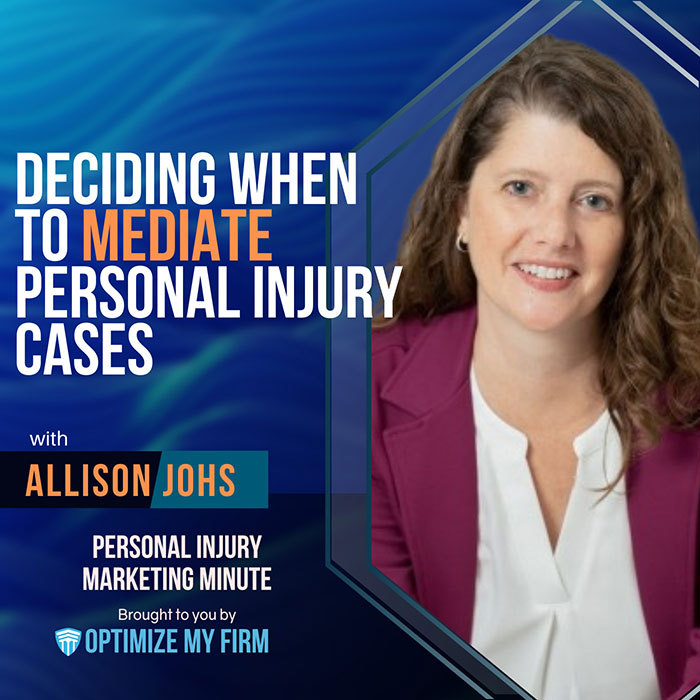Podcast: Play in new window | Download
Joining us for Episode #49 of the Personal Injury Marketing Minute is Allison Johs. This podcasts covers how mediation works in personal injury cases, the pros of mediation, what happens when things don’t work out, and how a personal injury attorney and their client can best prepare for mediation.
Visit Mediation Solutions of NY, LLC here: https://mediationsolutionsny.com/.
See all episodes or subscribe to the Personal Injury Marketing Minute here: https://optimizemyfirm.com/podcasts/.

Lindsey:
Welcome to the Personal Injury Marketing Minute, where we quickly cover the hot topics in the legal marketing world. I’m your host, Lindsey Busfield. When it comes to personal injury cases, there tend to be two avenues for resolving a case, settlement or trial. In both scenarios, the personal injury lawyer tends to negotiate and argue directly with the insurance company and their lawyers. While both of these options can yield great results, there is always some risk. Settling too soon can leave money on the table and going to court risks higher costs and doesn’t guarantee a favorable outcome. There is additional risk in some situations where the parties have an ongoing relationship that they would like to preserve, say, if someone was injured at a neighbor’s house. In some cases it would just make more sense to have a skilled mediator working with both parties to ensure the most favorable result for all. Allison Johs is joining us again today to discuss mediation for personal injury lawyers. Thank you so much for joining us.
Allison Johs:
Thank you for having me, Lindsey. It’s great to be here.
When Does It Make Sense to Mediate?
Lindsey:
When I think about mediation, I typically think about divorce cases, but mediation services can also be helpful for other legal sectors like personal injury. Can you give us some examples of when it might make more sense to mediate?
Allison Johs:
Absolutely. I think you alluded to the first one in your intro there, which is sometimes you have a relationship with the other party that you want to pre preserv.e It’s not just somebody that you are encountering just for this lawsuit or whatever led up to the lawsuit, and then you’re going to go your separate ways and never see each other again. And so you want to try to see if you can preserve that relationship. Sometimes you just need a neutral third party, and a judge is a neutral party when you go to trial, but the judge is constrained by what the law says and what the remedies are, according to the law. So you can settle a case directly with the other side, but sometimes you need that objective third party influence that doesn’t have a dog in the game on either side that can really listen to what each of the parties wants and what they’re looking for and can come up with a solution that maybe a court can’t come up with.
One of the biggest reasons right now to go to mediation, at least where I am, and I’m in New York, but I suspect that it’s similar to this all across the country. There’s a huge backlog and some of it is the result of COVID some of it is the result of staffing, but I know here in New York you can wait, even after all the discovery is done and the case goes on the trial calendar, you can wait three or four years to actually get the case resolved. So nobody wants to wait that long. Nobody wants to have their case hanging over their head. If you’re a plaintiff, you want to move on with your life and get whatever compensation so you can do the things that you need to do. And really it’s the same thing on the defense side.
And then there’s the costs. On the defense side, obviously, if you go to trial, you’re paying the lawyer for all the prep time and all of that, but even on the plaintiff side, you’ve got experts, you’ve got other expenses that go into preparing for a trial, and a mediation, you typically don’t have the same level of expenses.
How Does Mediation Work for Personal Injury Cases?
Lindsey:
Those are some great benefits, just cutting down on time and making sure that their relationship is preserved and ultimately maybe even getting a higher settlement amount for your client. So going into the mediation process itself, how does the mediation process work when it comes to a personal injury case?
Allison Johs:
Typically, in a personal injury case, one of two things can happen to start the ball rolling. You can talk to the other side and say, “Hey, we think this is a case. Maybe we can’t settle it on our own, but we want to use a mediator as that neutral third party.” Sometimes you need somebody just to literally talk some sense into your client that you’ve talked to yourself until you’re blue in the face. And especially if you’ve got a mediator who is somebody like a former judge who knows the jurisdiction, they know the value of the cases, they know what would happen typically if the case does go to trial.
Sometimes both parties can agree, “Yes, we want to go to mediation,” and then they look at where they want to go. Sometimes insurance companies have certain companies that they have to use, sometimes they’re individual mediators, sometimes it’s through a company. Or one party can go to the mediation company, and this happens with us sometimes. So say the plaintiff comes and says, “I’d really like to mediate this case, but I haven’t spoken to the other side.” And sometimes the mediation company then can go to the other side and say, “Hey, the plaintiff has come. They’re obviously willing to look at settling this case because they’re coming to us. Would you be willing to go to mediation? Here’s our panel of mediators.” And you can then talk about who you’re going to pick. And then it’s a more informal process than going to trial or going to an arbitration.
An arbitration is a little bit more like a trial and a mediation, typically, you don’t have witnesses testify, but you may have submissions that you do ahead of time that you send to the mediator. So for a personal injury case, you would submit some of the medicals and a summary of the medicals and you would talk about on the damages side. And then obviously on the liability side you would show the mediator or give them a submission as to what your arguments are with respect to liability, why you think the defendant is liable, what evidence you have to support that, but it’s not quite as formal.
And then when you go to the mediation, a lot of times the mediator will start by talking with everybody at once and then separate the parties out. And when the parties are separate and speaking to the mediator, they can ask the mediator, “Can you keep what we say confidential? I want you to understand where I’m coming from and what I really want to get to and why I want to get there or what’s important to me. And so I want you to take that into consideration as we’re trying to devise a solution. But I don’t necessarily want you to tell the other side everything that I’m telling you.”
So it’s a little different. When you go to court, you don’t have the opportunity to say that to the judge, really. Typically, you’re in the courtroom, you’re at trial, everything is presented publicly. So there may be some settlement discussions on the side, but the judge in court, typically, doesn’t have that kind of time to go back and forth. And then the mediator will go back and forth between the parties and try to get them to a resolution that works for everybody and that they can agree on, and then they do a settlement agreement. Or if they can’t come to an agreement, then they’re not bound and they can go back and they can try the case or they can do an arbitration that would be binding. But so you have a lot more control because you’re picking the mediator and you’re also involved in the process of getting to the resolution. You’re not just handing it to a judge and hoping that they give you the result that you want.
How Mediators Manage Tempers
Lindsey:
And it also ensures that you are able to have everybody’s voice be heard. And being able to have that one-on-one time with the mediator and have that confidentiality, allows all of the aspects that everybody’s bringing to the table to be accounted for. And that’s a really unique approach. And I’m sure there’s a lot of strategy that goes into that. And thinking about the stereotypical divorce mediation, when you see it on TV, you’ve got people fighting and tempers are flaring. How realistic is that and how does the mediator keep tempers in check if things do get heated?
Allison Johs:
Well, I think it can get heated. One of the things that’s an advantage for a mediation is the mediator can say, “You know what? Why don’t we take break?” And even to the extent where you could say, “We’re going to take a break and we’ll come back in a week,” to give people some time to think, “Why don’t you think about some of the things we talked about, some of the potential solutions, talk it over with other people in your family, or whatever. Just give it time to percolate and then we’ll come back to the table.” You don’t get that as an opportunity when you’re in court. It’s pretty much all or nothing, and that’s it.
But I think that whole concept of talking to people separately and if it’s a really heated situation, you may be able to tell the mediator upfront, “We don’t want to be in the room at the same time. We’ll be in the building at the same time, so we can go back and forth.” Or you can do these mediations virtually too, and where you put people in breakout rooms so they can’t hear the other conversation. And I think that helps letting each side be heard, as you said before, but confidentiality. And also I think a lot of times mediators deal with the heated portions by saying, “Well, let’s start with what we do agree on and what shared goals we do have, and then we’ll see if we can bring the temperature down a little bit that way too, that we see that there are points of mutual agreement.”
Is Mediation Confidential?
Lindsey:
That’s great. That’s a really unique way to be able to control the conversation itself. And as you said before, parties are not bound to the outcome of the mediation if neither party is able to budge. But is everything that is presented during mediation eligible to be used during a trial?
Allison Johs:
No. Typically, it’s considered confidential, and that may depend on what kind of mediation you do. It may be different in different jurisdictions too. Usually there’s a mediation agreement that you will sign before you go to mediation. And so for us, typically, those agreements say that nothing that happens… It’s just like in a settlement talk. You can’t bring that to trial. That was for purposes of settlement. So same thing with the mediation. So anything that’s said, not just to the mediator in those individual meetings, but also in the group setting, it doesn’t transfer over to trial. Now whatever evidence you have and witnesses and all of those things, obviously that doesn’t suddenly become confidential because you went to mediation. But those conversations and what was said in those conversations doesn’t leave the mediation, so to speak.
Lindsey:
That’s great. So there’s really not a lot of risk in going to mediation that you wouldn’t otherwise have. How successful is mediation percentages?
Allison Johs:
I don’t have specific percentages, and obviously it really depends on what kind of case, but I know that more and more cases are getting resolved by mediation every day, in part because of these backlogs. And also in part because I think lawyers and litigants are, in some ways, getting tired of the typical process. And there are a lot of cases where you have these relationships that you want to preserve. And so when both parties are motivated to actually settle the case and it’s not a case where my whole goal is to just hurt the other person, then you typically can come to a resolution and get the case mediated. And even if you can’t get the entire case resolved through mediation, mediation is also a good way to narrow down the issues where you could resolve certain things.
So maybe you can’t budge on some things, but there are other things that you can get resolved. So now you’ve narrowed down, so you’ve reduced the time it’s going to take to try the case and you’ve reduced the expense of trying that case. So I don’t need to bring that expert because we are stipulating to this at trial, based on the mediation.
Lindsey:
That brings down the time and the cost a lot.
Allison Johs:
Exactly. So I think those things have been very successful and we’ve been seeing a lot of people, even if they don’t resolve the first time at mediation, sometimes they go back a second time and maybe even a third time, and they do ultimately get resolved because they start chipping away at those issues and then they finally get to the point where they say, “Look, we can see the finish line, so we want to just get the rest of it done.”
Hot to Prepare for Mediation
Lindsey:
Right, absolutely. And so if an attorney and their client are preparing to go to mediation, how can they best prepare?
Allison Johs:
Again, it’s more informal than a trial, but you still want to make sure that you’re prepared. So you want to do a mediation submission. In a lot of places a mediation submission is not required. You can just show up at the mediation and talk to the mediator and try to resolve the issue. But it’s always better for the mediator to be prepared because then they can start thinking about what the issues are and what they see. The mediator is much more able to approach the situation in an educated way if they have more information from you. So presenting your major arguments to the mediator, and you can tell the mediator that they have to keep this submission confidential as well, not just what’s said at the mediation.
So talking about and thinking about sitting down with the client, what are the most important things to you? What is the resolution that you would like to see? Are there some things that maybe are different about your situation than any other person that was in a car accident that has this issue now? And let the mediator know those things so that they have that ahead of time to be prepared for the mediation.
Lindsey:
That makes a lot of sense. Well, how can attorneys get in touch with you to learn more?
Allison Johs:
I am one of the founders of a company called Mediation Solutions of New York, and we do mediations and arbitrations also for all kinds of disputes, including personal injury. Our website is probably the best place to get information about us or about mediation in general. And that web website is mediationsolutionsny.com.
Lindsey:
Great. Well, we will make sure that we have that information available on our page. And thank you so much for joining us today.
Allison Johs:
Thanks Lindsey.


